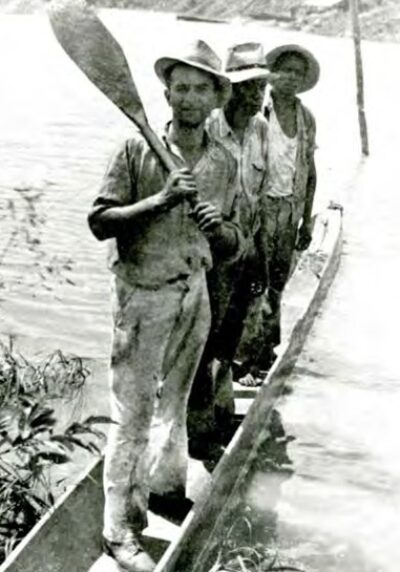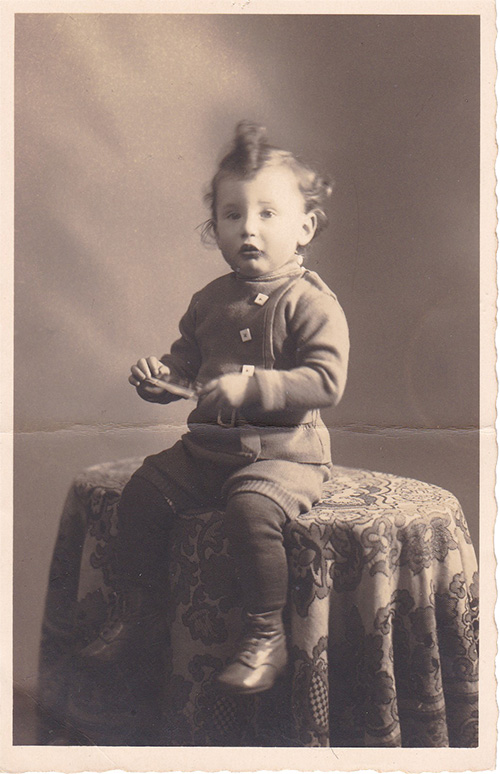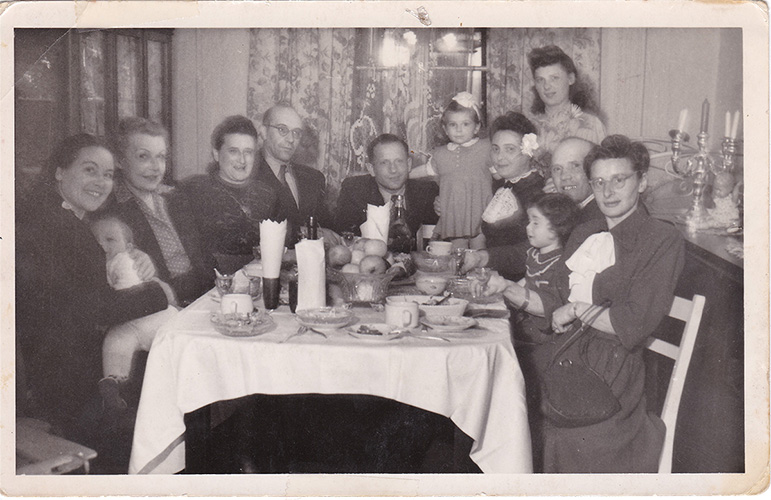Alfred Caro
Biography
Alfred Caro was born July 27, 1911, to Sally and Frida Caro in Samter, Germany. The family of eight then moved to Berlin, Germany, where Sally, a decorated veteran of World War I, bought a butcher shop. Alfred had fond memories of his childhood in Berlin, where he was raised in a conservative Jewish home.
In public school, Alfred was one of the only Jewish students. He participated in a number of local sports clubs and particularly enjoyed boxing. After Alfred completed his compulsory education, he studied to be a butcher in Halberstadt, Germany, for three years, returning to Berlin in 1928. Alfred recalled that shortly thereafter, the depression hit Germany hard, and the Nazi party rose to prominence.
Once Hitler came to power in 1933, Alfred noticed changes taking place around him, including antisemitic legislation. About this time, Alfred’s father’s business failed when his non-Jewish clientele dwindled. In 1935, after the Nuremberg Laws stripped the Caro family of its citizenship and rights, they became Zionists and tried to find ways to flee Germany, but it was too expensive to leave. In 1938, while being falsely sought as a political opponent, Alfred turned himself in to Nazi authorities, hoping his actions would protect his brothers.
Upon arrival in Sachsenhausen concentration camp, Alfred was forced to do hard labor amid primitive conditions and brutal treatment, all the while witnessing the arrival of new transports from all over Germany. After six weeks of appealing to the police in Berlin, his mother managed to orchestrate his release from Sachsenhausen in July of 1938.
HICEM, a large aid organization in Berlin, helped Alfred get a visa to immigrate to France where he lived in Paris with other refugees until he and about 500 other German and Austrian refugees were granted permission to live and work in Colombia. After two weeks aboard a ship called Cuba, Alfred arrived in Colombia with no money, possessions, nor the ability to speak Spanish. Until he caught malaria, Alfred worked in the gold mines deep in the Colombian jungle. Later Alfred moved to Bogota, where he became very successful, eventually owning a restaurant and butcher shop with an affluent clientele.
In 1952, Alfred decided to join his sister, Norma, who had earlier immigrated to America, settling in New York and learning English while working as a butcher for a German-owned delicatessen. He arrived in New York in November 1952. There he worked as a butcher in a delicatessen. While on vacation in the Catskills, Alfred met his future wife, Helen Nathan Arkus, a divorcee from Atlanta who had a son, Allen. After a quick courtship, they married in New York in 1954, and Alfred joined his new family in Anniston, Alabama. He spoke Spanish and German, but had to learn English. After first working in the store/restaurant owned by the Nathan family, he bought Caro’s Annistonian Restaurant that served as the center of both Anniston’s power brokers and fans of gourmet food. Alfred and Helen had a daughter, Alice. The Caro’s enjoyed living in Anniston, especially the warmth of the local people and donating to many local causes, particularly the YMCA.
(Based in part on Bio Profile from “Echoes and Reflections”)
More Information
Frieda Abramcyk
(November 19, 1881 – 1942 Auschwitz)
Sally Caro
(April 19, 1880 – 1942 Auschwitz)
After World War I, it became Szamotuly, Poland
Jenny Caro
(May 15, 1910 Samter – 1942 Auschwitz)
Alfred Caro
(1911 -2007)
Nora Caro
(1913 Samter – 2000 Jefferson, TX)
Husband: Walter Martin Mielzynski (Mielz), (1907 Berlin-1992 Los Angeles)
Arrived Miami June 18, 1946
Siegbert Caro
(June 10, 1914 Samter – 1942 Auschwitz)
Aleksy Caro
(February 6, 1921 Samter – 1942 Auschwitz)
Cecilia Caro (Spector)
Herta (Helen) Nathan
(1913-1967)
Married Nat Arkus (1899-1951), 1945
Married Alfred Caro in New York, NY, September 5, 1954
Allen Arkus
(1947-2018)
Alice Paulette Caro (Roy Burkette)
(1955 Anniston – )
Sachsenhausen / 1938
First immigrated from Europe to Columbia, South America.
Immigration to Anniston sponsored by his wife’s mother’s brother, Lee Freibaum
Resources
-
Video Testimony
USC Shoah Foundation Interview
July 31, 1997 | Anniston, AL -
History & Related Resources
Survivor Stories, Alfred Caro
Temple Beth-El / Anniston
Written by Sherry Blanton, 2010



